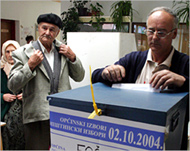Apathy clouds Bosnian local elections
Frustrated by yet another election for officials who can do little to improve their situation, many Bosnians are expected to stay away from the polls in Saturday’s vote to choose municipal leaders.

The election for new councils and mayors in 142 municipalities is the first post-war vote to be fully funded and organised by Bosnian authorities.
It is also the first in which mayors of Bosnian cities will be directly elected. Recent public opinion polls predicted that less than half of the more than 2.3 million eligible voters would participate.
Most of the voters turning up in the early hours were elderly. Slobo Sanojevic, 60, who voted in Banja Luka, had high hopes.
“I would not miss the elections for anything. I want good schools for my grandchildren, a safe city and regular pensions. Now, is that too much to ask?” he said.
Fruitless elections
But most Bosnians are “tired of repeated fruitless elections,” said political analyst Tanja Topic from Banja Luka. “Nobody elected so far has managed to solve any of the problems poisoning people’s everyday life, and in the eyes of the average citizen, all parties have become the same.”
|
“I can’t see the difference between the candidates. I’m sick of politics” Marko Peric, |
Marko Peric, 63, from Mostar, agreed, saying he would not vote because he does not know whom to pick.
“I can’t see the difference between the candidates,” he said. “I’m sick of politics.”
Since 1990, the country has been largely led by three main nationalist parties: the Party for Democratic Action, a Muslim bloc; the Serb Democratic Party and the Croat Democratic Union.
The parties led their ethnic groups throughout the 1992-95 Bosnian war between Muslims, Serbs and Croats. An estimated 250,000 people were killed and 1.8 million driven from their homes.
The war ended with a 1995 peace agreement that recognised the country within its original borders, but internally divided it along ethnic lines into a Muslim-Croat Federation and a Serb Republic.
The conflict ruined the country’s economy and infrastructure. Unemployment is almost 40% and the average salary barely suffices to make ends meet.
Similar promises
For the past eight years, candidates have delivered similar promises: more jobs and improved lives. But none of the elected officials have delivered what the voters hoped for.
 |
|
The final results of the polls are |
“I would vote if I had a relative or a friend on those lists. Every politician is taking care only of himself, his friends and family. You need connections everywhere to achieve something. I don’t have anybody, so there is not point in voting,” said Jasmin Kunosic, 32, from Tuzla.
A non-nationalist party, the Social Democratic Party, won municipal and general elections four years ago in Muslim-dominated areas of the country.
But the party failed to bring quick improvements, and disappointed voters returned to the nationalists in general elections two years later.
Organising elections
Postwar Bosnia is partly administered by international officials whose job is to implement the 1995 Dayton peace agreement.
For years, the Organisation for Security and Cooperation in Europe organised Bosnian elections.
|
“Many people don’t see the point in voting if those they choose get fired anyway” Tanja Topic, |
The country begun organising elections itself three years ago, after it adopted an election law.
Bosnia’s top international official, Paddy Ashdown, has the right to impose laws and fire politicians who obstruct the peace agreement.
This summer, he dismissed more than 60 top Bosnian Serb officials, mainly members of the ruling nationalist Serb Democratic Party, claiming they supported war crimes fugitives.
“Many people don’t see the point in voting if those they choose get fired anyway,” said Topic, the Banja Luka analyst.
No change expected
But Senad Ridjanovic, 43, an engineer from Sarajevo, said he would vote although he did not expect those elected to get the country on its feet any time soon.
“The way I see it: If I’m not too lazy to go buy a lottery ticket every week although I know the chances are one to several million I will get something, then I can do this, too, once every couple years and go home and hope,” he said.
Voters will cast ballots for 70 parties, 18 coalitions, six independent lists of candidates and 144 independent candidates at 4065 polling stations. Polls opened at 0500GMT and were to close 12 hours later.
Preliminary results are expected late on Saturday, and final results within 30 days.